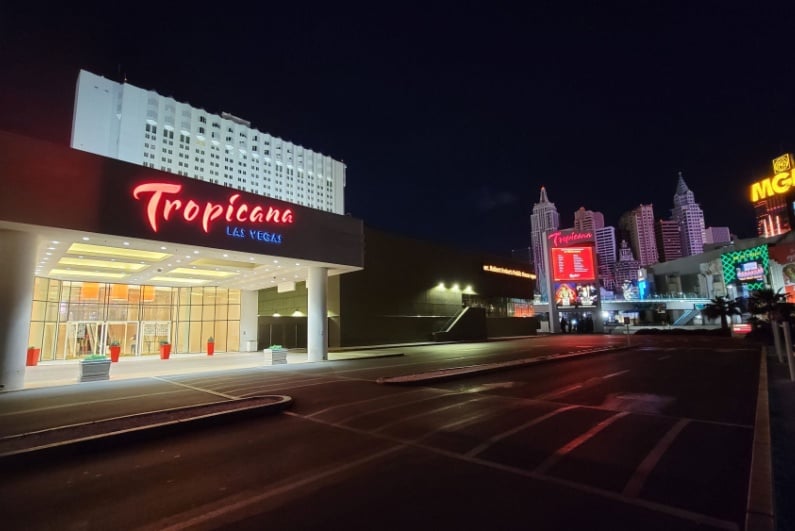A last goodbye
One of the most famous casinos on the Las Vegas Strip is closing its doors for good. The Tropicana will shutter on Tuesday ahead of its planned demolition later this year. It will make way for a new sports arena which is likely to host the Oakland A’s from the 2028 MLB season.
The Tropicana opened in the 1950s and quickly became symbolic of the glitz and glamour of Sin City. During its time in the limelight, it hosted some of the world’s most famous faces, the city’s longest-running shows, and even movie productions.
became synonymous with the darker underbelly of Las Vegas
However, in its early years it also became synonymous with the darker underbelly of Las Vegas – one run by the mob. It is widely understood that Frank Costello, perhaps the most infamous gangster at the time of the casino’s opening in 1957, had a large involvement in the operations of the business.
Phil Kastel and Frank Costello
When The Tropicana opened in April 1957, Miami-based Ben Jaffe owned the land on which the resort sat. He was also part owner of the Fontainebleau in Miami Beach. Meanwhile, the actual construction of the property had fallen under the remit of Conquistador Inc, which would also operate the resort.
This is where the mob comes in. Conquistador Inc owner “Dandy” Phil Kastel had ties to gangsters through a partnership with Frank Costello. Kastel and Costello first formed their partnership in New Orleans, where together they operated the Beverly Club casino. They also ran a Louisiana slot machine operation.
It goes without saying that when Kastel first set his sights on developing The Tropicana in the gambling hub of Las Vegas, Costello was bound to get involved too. It is also perhaps obvious that Kastel, keen to avoid the scrutiny of the Nevada Gaming Commission, denied any involvement from Costello, instead claiming they were just “good friends” rather than business partners.
Ultimately, the resort cost $15m to build, the largest price tag of any on the Strip up to that point.
Assassination reveals all
The carefully balanced relationship between Kastel and Costello could only last for as long as the Nevada gaming regulator failed to shine a light on it. That time came just months after the opening thanks to an assassination attempt on the life of Costello.
Vincent “the Chin” Gigante shot and wounded Costello as he entered a New York apartment building
On orders of rival Mafia boss Vito Genovese, Vincent “the Chin” Gigante shot and wounded Costello as he entered a New York apartment building. Costello survived the attempt, but a piece of paper found inside his coat pocket appeared to give away his part in The Tropicana’s operations.
The paper showed the exact gross win of the resort as of April 27, 1957 – $651,284. It also mentioned the proceeds from slot machines specifically at $62,844 as well as $30,000 for “L” and $9,000 for “H,” likely referring to the amount to be skimmed on behalf of Costello’s partners.
The moment spelled the beginning of the end for Kastel’s control of The Tropicana. Months after the incident, the Nevada Gaming Commission refused to license the mob-linked businessman, and Jaffe chose J. Kell Houssels to replace him.




